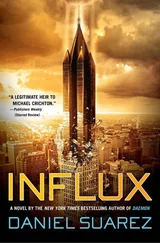The Major stared down the length of Sheikh Zayed Road from his conference room on the fifty-third floor. Gleaming skyscrapers lined the twelve-lane highway below, creating a man-made canyon topped by familiar multinational logos. Not far off he could see Burj Dubai, the tallest building in the world. Its towering presence helped remind everyone that this wasn’t a wasteland of sand, but a petri dish of business culture.
Dubai was the perfect business environment. A blank slate—the way it should be everywhere. No interference. No taxes. No protestors. It had been a smuggling port for centuries, bringing gold into India and serving as a conduit for everything from slaves to silks. But now the coves and creeks on the coast had been turned into marinas for mega-yachts and resorts packed with sunburned Russians. First-world infrastructure and office blocks had been laid down with such vengeance in the last ten years that slow-moving pedestrians risked being paved over.
What The Major liked most about the Emirates was that there was order . Everyone accepted their role. The Filipinos provided service, the Indians and Bangladeshis provided labor, and expats from the U.S., Europe, Japan, and China did the business. The Emiratis . . . well, everyone needed at least one, but they stayed out of the way for the most part.
The only real authority was the market, and that was increasingly true the world over.
The Major returned his attention for a moment to the conference room and two MBAs tag teaming a PowerPoint presentation. They were here to parse reality into benchmarks and deliverables. He glanced over at his staff agronomist, who was listening with rapt attention to their bullet points, taking notes. That was his purpose.
But not the purpose of the meeting. The Major stood along the rear wall, ostensibly a back-office troll. However, these young MBAs had no idea that they were really taking this meeting with him . They were bringing a problem that needed solving, even if they didn’t realize it. They were the messengers.
His firm would get the contract. It would be for an infrastructure security assessment or a market risk analysis, or something similar. Korr Business Intelligence Services did not advertise, and they did not submit proposals. They were the junior partners of a security consultant to the engineering department of a construction division of a real estate subsidiary of a financial group. They had no signage out front and no listing for their firm in the lobby directory. Most of their employees were economists, researchers, and mathematicians. And very few of them had any idea what they were really doing here: preserving the global economy.
The two MBAs were still droning on about methodologies. These junior executives were always so earnest in their Savile Row suits. One was a pasty-white Brit, the other a Pakistani, also with an English accent. Probably graduates of the best schools. A wife and two young children at home—and no idea that there was video on file somewhere of them having sex with young women (or men) while they were on business in Panama, or Mali, or Brazil, or anywhere really. Get the footage while they’re up-and-coming—before they suspect anyone would care. Before they become powerful. These rich dynasties had been using offshore photo mills for decades to enforce loyalty with one another, their business partners, and their kids. Get them married, set them up as respectable people in the community. Pay them tons of money—but always get photos of them with underage hookers. The more perverse the better. It could pay huge dividends when they chaired a government committee or tried to go public with damaging information. Political ideology didn’t matter. They hosted junkets for left-wingers, right-wingers. The Major had cut his teeth on a Panama operation like that back in the late eighties, using cocaine and sex workers to generate potentially career-ending imagery that made the business world go round. Photoshop had pretty much ended the still picture side of the business by making photographs meaningless. High-def video was the only way to go now, and sooner or later computer graphics would do that in, too. Someone really had to come up with a solution, or the entire blackmail industry was doomed. Thankfully, The Major had long ago moved on to more serious operations.
The MBAs were now evaluating world commodity markets, highlighting key items with laser pointers.
The Major contemplated his present line of work—and what led him here. It was over twenty years ago that he’d taken his first life. God did not, in fact, strike him down. Instead, a problem disappeared.
He still remembered the musty smell of the La Paz hotel room. The bray of a two-stroke engine whining past outside while he stood with a bloody knife in his hand. The young trade unionist on the floor, her wide eyes staring at him as she clutched her throat, gurgling. Nothing stopped. The universe didn’t care. He might as well have been slicing bread.
And that began his awakening—his realization that the Western world was a bedtime story of comforting humanistic bullshit. Slavery existed everywhere—even in the United States. We were all slaves in one way or another. Slavery was just control, and control kept things running in an orderly fashion. It was what made progress possible.
But now the problem he’d been waiting on suddenly appeared on screen. A bar graph labeled “Decline in U.S. Agricultural Subsidy Applications.” He turned away from the window and tuned in to the Pakistani MBA’s presentation.
“. . . in certain counties, we’re looking at a ninety percent drop—unprecedented in the history of modern American agriculture. Farmers in these counties have basically decided en masse to stop growing subsidized crops—even though there is no distribution system available for anything else. Something is causing this, and causing it all at once on a local basis in defiance of market conditions.”
The Major saw it. Nothing else had the scope to do this—and with such suddenness. It had to be the Daemon.
He spoke from the back of the room. “Why would farmers willingly turn down subsidies? With prices rising, why would they not grow corn or soybeans?
“Excuse me, you are . . . ?” The Pakistani was taken aback by this sudden question from a junior staffer in the back of the room.
The Major’s agronomist stepped in. “Yes, that’s a good question. Why isn’t the free market correcting this imbalance?”
The Pakistani turned back to the front row. “Uh, we haven’t been able to determine the cause. These numbers are for the coming year.”
The Major spoke up again. “And you have on-the-ground confirmation. This isn’t just a reporting glitch?”
“No, it’s not a glitch. Agribusiness and biotech firms have a comprehensive network of private investigators, researchers, and surveyors throughout the Midwestern United States to enforce their seed patents. They’ve documented population movements, unexplained capital inflows, and infrastructure investments in alternative energy technologies, high-tech equipment, heirloom seed stock, and—”
“I assume this isn’t confined to the United States.”
The two MBAs looked at each other with some dismay. The Pakistani nodded. “We were, in fact, going to cover that later in our presentation.” He started clicking through interminable bullet points and diagrams. “We also project reductions in export crops such as cotton in Asia and Russia. Security services in various countries are reporting labor unrest in both the agricultural and industrial sectors. The number of container ships being placed into warm and cold layup from lack of cargo is rising.”
It’s tearing apart the global supply chain.
Читать дальше












